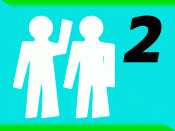Human Cloning, Non-human Consequences
During many years the human cloning has been discussed in medical, scientific, public and political circles around the world.
The ethics and legitimacy of the human and embryo cloning turned into a serious discussion topic for UN members. The last year the group of member-countries of the UN Legal Committee led by USA where human cloning is proposed to be a federal crime1) and Costa-Rico made the effort to ban of all forms of human cloning. Vatican, which is not a UN member also supported this effort, voicing in favor of countries where the Catholic Church holds strong influence2). The England, France and Germany support the opposite view; they consider the total ban on human cloning research as harmful to the development of medical science3).
This controversy reflects the arguments in favor of reproductive cloning, which state that for now it is the only foreseeable way of reproduction for people who is unable to have children physically or want to "revive" the lost ones.
This reason is substantial and respectful. Really, why a family without children should rely on adoption of a child with unknown origin when at least one of the parents could provide his/her genes? If parents lost a child whom they loved, why not allow them to make another one from spare cells saved exactly for this purpose? The answer is that the risk is too high and uncertainties are too wide.
We all know that many qualities of a person are inherited. Body shape, hair and eye color, mental and physical abilities of a clone are very likely to be the same as in the original. What, however, can we say about personality of such a child and later, a grown person? The studies of separated twins showed that even up...



Good essay
I really liked the essay and the comments. It's a good point of view, and appropriately addresses the opposition. Great Job!
6 out of 6 people found this comment useful.